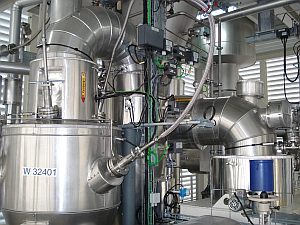All obstacles to the completion of the bioliq® pilot plant on Campus North of Karlsruhe Institute of Technology (KIT) have now been eliminated. After the approval of funding in the amount of Eur 11 million by the federal and state governments, contracts have been concluded with the companies cooperating in the construction of the last two process steps at KIT. In these two steps, environmentally compatible biofuel of the second generation shall be produced from biogenic synthesis gas.
"Only after completion of this last construction phase will we be able to demonstrate the complete process chain from the straw bale to the fuel dispenser. This is absolutely necessary for holistic process assessment,” says Nicolaus Dahmen, head of the plant construction project. Synthesis fuels, also called BTL (biomass to liquid) fuels, can be produced from straw and other biogenic residues. The advantage: They are not suited as food or feeding stuff, nor do they require additional cultivation areas.
The first process steps of the bioliq® pilot plant on KIT Campus North have already been implemented by KIT scientists in cooperation with the industry partner Lurgi GmbH.
The first step serves to concentrate the energy. At regionally distributed plants, dry biomass, such as straw or other biogenic residues, is converted by flash pyrolysis into an intermediate product of coke and oil similar to crude oil. This so-called bioliqSynCrude® contains about 90 percent of the energy stored in the biomass. Its energy density is more than 10 times as high as that of the feedstocks. The pilot plant to demonstrate this process step has already been built on KIT Campus North. Test operation has started. The bioliqSynCrude® can be transported over large distances in an economically efficient manner and then processed further at large facilities usually applied for fuel production.
There, the energy-rich suspension is converted into synthesis gas, a chemically reactive mixture of carbon monoxide (CO) and hydrogen (H2). For this purpose, an entrained-flow gasifier is used. It is presently under construction on KIT Campus North. The flowable bioliqSynCrude® is mixed with oxygen under pressure and reacts to the chemical components required at temperatures higher than 1000°C. These components can then be reacted specifically to tailored designer fuels.
This will be done in the third plant section, the construction of which will start soon in cooperation with two industry partners. These are the companies MUT Advanced Heating GmbH from Jena for hot-gas cleaning and Chemieanlagenbau Chemnitz GmbH, an internationally active company for process technology that cooperates with KIT in the field of synthesis. Both partners will not only supply and install the plant sections, but also commission and further develop them in cooperation with KIT. “We now enter the important phase of process implementation on the pilot scale of 100 liters of designer fuel per hour,” underlines Dr. Peter Fritz, KIT Vice President for Research and Innovation. “This is the decisive step for industrial application after several years of initial research at the laboratory.”
Hot-gas cleaning has to be designed such that impurities like particles, chlorine and nitrogen compounds are separated from the synthesis gas. The KIT scientists will apply a novel cleaning technique at 500°C. Compared to conventional processes that require temperatures far below the freezing point of water, energy consumption can be reduced by 10%.
Further fuel production normally covers several intermediate chemical steps. Some of them are combined in a single innovative process at the bioliq® pilot plant. Similar to known processes of fuel production from natural gas, an Otto fuel will then be produced from dimethyl ether. This Otto fuel can be further developed, for example, for direct fuel injection.
Karlsruhe Institute of Technology (KIT) is one of Europe’s leading energy research establishments. The KIT Energy Center pools fundamental research with applied research into all relevant energy sources for industry, households, services, and mobility. Holistic assessment of the energy cycle also covers conversion processes and energy efficiency. The KIT Energy Center links competences in engineering and science with know-how in economics, the humanities, and social science as well as law. The activities of the KIT Energy Center are organized in seven topics: Energy conversion, renewable energies, energy storage and distribution, efficient energy use, fusion technology, nuclear power and safety, and energy systems analysis.
Being “The Research University in the Helmholtz Association”, KIT creates and imparts knowledge for the society and the environment. It is the objective to make significant contributions to the global challenges in the fields of energy, mobility, and information. For this, about 10,000 employees cooperate in a broad range of disciplines in natural sciences, engineering sciences, economics, and the humanities and social sciences. KIT prepares its 22,800 students for responsible tasks in society, industry, and science by offering research-based study programs. Innovation efforts at KIT build a bridge between important scientific findings and their application for the benefit of society, economic prosperity, and the preservation of our natural basis of life. KIT is one of the German universities of excellence.

